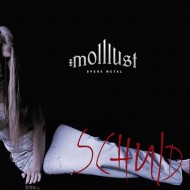 This album unashamedly announces itself on the sleeve as “opera metal”, which brings to mind a number of possibilities, among them Nightwish, Therion and Diablo Swing Orchestra. This is a band comprising an operatic singer as you’d expect, a cellist, pianist, electric violinist, guitarist, bassist and drummer. The starting point is hard to determine. When winning BachSpiele, a competition for musicians and artists in Leipzig, this group of German musicians performed interpretations of arias. The image-ridden cover and inserts of this album, which means “Guilt”, suggest something distinctly dark.
This album unashamedly announces itself on the sleeve as “opera metal”, which brings to mind a number of possibilities, among them Nightwish, Therion and Diablo Swing Orchestra. This is a band comprising an operatic singer as you’d expect, a cellist, pianist, electric violinist, guitarist, bassist and drummer. The starting point is hard to determine. When winning BachSpiele, a competition for musicians and artists in Leipzig, this group of German musicians performed interpretations of arias. The image-ridden cover and inserts of this album, which means “Guilt”, suggest something distinctly dark.
So what does the music of Molllust sound like? The answer is “all of the above”, or as the band themselves define it: “The heart is classic, metal is the pulse”. As objective as I’d like to be, I just don’t find this interesting. In fact it drove me nuts as when Mrs D decides to play her bloody Monteverdi. The female opera singer could shatter glass, and shrieks and warbles on endlessly in German. Instead of ordering her out of the room with no tea to put us out of our misery, the singing menfolk exhort her to join in with the fire dance (“Tanz des Feuers”) and suggest that passion (“Leidenschaft”) fills the walls between them. The old Leidenschaft was delivered with such harshness that I was unable to locate it. It’s all about pain, yearning and destroyed dreams and so forth but it’s all so laboured.
I know Germany has a tradition of classical music and Lieder and so forth but this is all mixed up. Musically it stops and starts, with the metal sections cutting in out of apparent obligation to interrupt something that was fundamentally unpleasant to start with. It’s all supposed to be epic but between the distinctly un-angelic voice and the lack of structure, genuinely dynamic moments are few and far between. “Sternennacht”, which strangely and no doubt unintentionally seemed to have taken a piece from Sparks’s “This Town Ain’t Big Enough for the Both of Us”, almost hit the mark but even it had, it would have been swamped by the aimless cacophony which surrounded it. I like the moody sound of the cello and I liked it here, but even though in theory it fitted the broody theme of this album nicely, it couldn’t save the day.
In what I imagine to be unintended irony, the last track “Kartenhaus” has the line which can be translated as “I am only the architect, not the painter”. Exactly. In their bid to design this album, I can see that Mollust have packed all their ideas together quantitatively without creating anything which vaguely resembled beauty of form. We needed the painter and his palette to draw out the artistic vision and capture us. The painter was indeed missing. Shocking.
(2/10 Andrew Doherty)

Leave a Reply